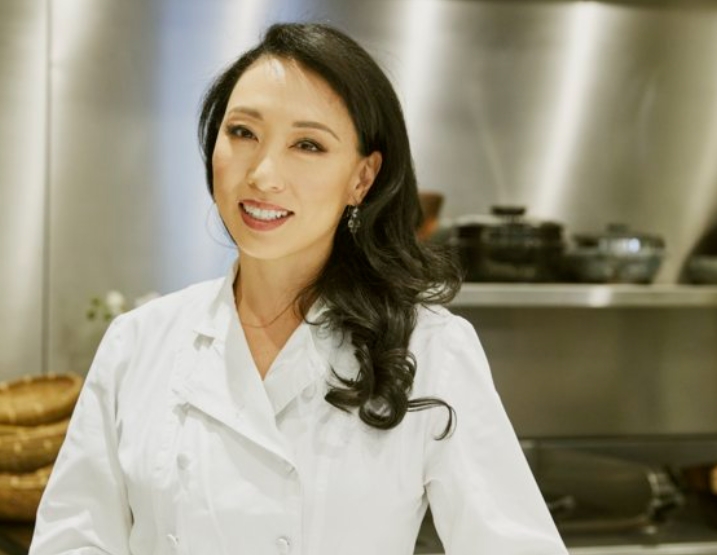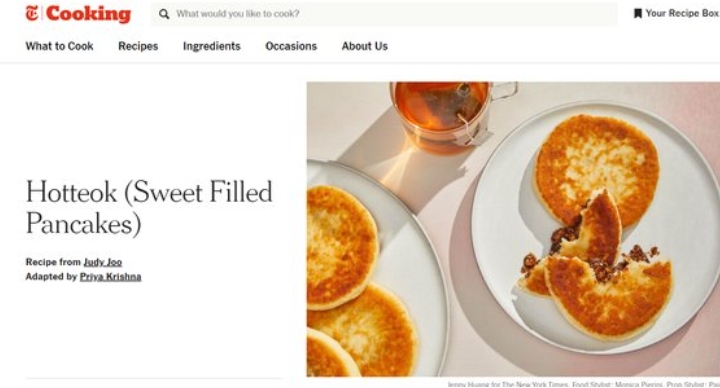A decade ago, when Korean-American chef Judy Joo, 47, approached a cooking show and said, “I want to introduce Korean food,” she was met with a cold response. At that time, Americans without personal ties to Korea were largely limited to exploring Korean restaurants on their own.
Chef Joo believed in the power of Korean food and convinced the station to debut ‘Korean Food Made Simple.’ She also published a book with the same title, establishing herself as a trailblazer in the globalization of Korean cuisine. Last month, she introduced a recipe to the New York Times (NYT): Hotteok.
The NYT Cooking section, a distinct part of the media’s paid content, featured the Hotteok recipe, which became a popular favorite among readers, earning a 4 out of 5 rating. Hotteok is a dish that extends beyond the already familiar bibimbap, kimchi, and ramen, targeting the curiosity of Americans eager for new Korean culinary experiences. The Korea Daily recently connected with Joo via email.


Originally a high-earning financier at Goldman Sachs and Morgan Stanley, Chef Joo, after her graduation from Columbia University, was at the pinnacle of her career. Nevertheless, she chose to leave her financial career behind to embrace her passion for cooking.
Her father, who had endured the hardships of fleeing North Korea during the Korean War and succeeded in graduating from Seoul National University’s medical school, along with her mother, who prepared dumplings during holidays, supported and encouraged Joo to pursue her culinary dreams.
The following is an edited excerpt from the interview:
-What made you switch from being a financier to a chef?
“I had substantial experience and growth in Morgan Stanley’s asset analysis team, but my passion for the financial markets and finance was overshadowed by my love for food and culinary literature. Realizing that I would find greater happiness in the culinary field, I embarked on this new path. Initially, my parents were hesitant, but they could not deter their financially independent daughter. I immediately enrolled in culinary school, and I’ve been dedicated to this path ever since.”
-Isn’t being a chef a physically demanding job?
“It certainly is. The job requires a minimum of 12 hours a day. It can be repetitive and challenging, particularly when you’re starting at the bottom. However, for those who persevere and grow, there comes an opportunity to innovate and create. The satisfaction of developing new flavors and dishes is unmatched.”
-You’re recognized as a pioneer in globalizing Korean food.
“I believe ‘Korean Food Made Simple’ was likely the first show on Korean cuisine to be broadcast internationally for two seasons. Initially, it was a challenge to have my concepts accepted, but as Korean culture continues to gain global traction, the desire to learn and understand more about Korean food has grown. This brings me immense joy.”

-How should Korean food be presented in 2024?
“The vast number of Koreans living abroad and foreigners with a deep understanding of Korea are perfect ambassadors. They’re well-versed in Korean flavors and can bridge the gap with other cultures. For example, Korean-style chicken gained popularity in the U.S. through Americans who had served in Korea. Korean food doesn’t need to be strictly traditional; what we innovate today becomes tomorrow’s tradition.”
-Can you provide more details on that?
“If an American couple in Kansas City incorporates gochujang into their spaghetti sauce, or a young man in Manchester is experimenting with kimchi in his potato dishes, these are all modern interpretations of Korean cuisine. Moreover, with fermented foods becoming a focal point in today’s culinary scene, the essence of Korean food, known for its fermented delicacies, continues to charm food enthusiasts globally.”

-Has the heritage of your father from North Korea influenced you?
“My family traditions, especially making hand dumplings during holidays and enjoying cold noodles, are deeply ingrained in me. My father’s resilience, having rebuilt his life after losing everything in North Korea and succeeding in South Korea and the U.S., is an inspiring narrative. My culinary tastes have been deeply shaped by both of my parents, exemplified by our family tradition of savoring both mild and spicy cold noodles, which mirrors my mother’s heritage from Incheon.
Chef Joo’s schedule for the coming year is packed with various engagements, including book releases, television appearances, and restaurant openings. Among her upcoming projects is a collaboration with actor Ryu Soo-young, known for his culinary prowess on the Korean show ‘Fun Restaurant.’ Chef Joo eagerly anticipates her visits to Korea, saying, “When I go to Korea, the first thing I eat is soft tofu soup. I can’t wait to immerse myself in Korea’s rich food culture and experience the joy it brings.”
BY SUJIN CHUN, JUNHAN PARK [chun.sujin@joongang.co.kr]





